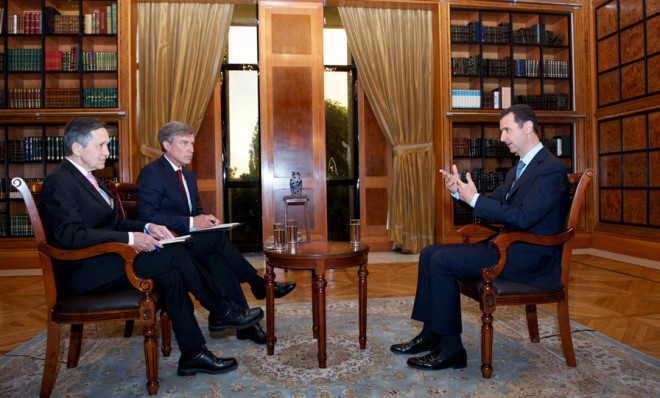A year to destroy Syria's chemical weapons is an unrealistic goal
The Syrian president gives Fox News a timetable and a cost estimate. How does that compare to other countries?

A free daily email with the biggest news stories of the day – and the best features from TheWeek.com
You are now subscribed
Your newsletter sign-up was successful
Yesterday, Syrian President Bashar al-Assad sat down with Fox News correspondent Greg Palkot and, oddly enough, former Rep. Dennis Kucinich (D-Ohio), to claim that Syria did not use chemical weapons in an Aug. 21 attack on the Damascus suburb of Ghouta.
Assad also claimed Syria was "committed to the full requirements of the agreement" reached by the United States and Russia to destroy the country's stockpile of chemical weapons, even if it looks like Syria will miss this weekend's deadline for submitting its inventory of chemical weapons to international inspectors.
He then set a timetable for the stockpile's eventual destruction:
The Week
Escape your echo chamber. Get the facts behind the news, plus analysis from multiple perspectives.

Sign up for The Week's Free Newsletters
From our morning news briefing to a weekly Good News Newsletter, get the best of The Week delivered directly to your inbox.
From our morning news briefing to a weekly Good News Newsletter, get the best of The Week delivered directly to your inbox.
I think it is a very complicated operation technically and it needs a lot, a lot of money. Some estimated about a billion for the Syrian stockpile. It has a certain schedule. It needs a year, or maybe a little bit more. [via TIME]
That timeline is more or less in keeping with the deal being worked out by the U.S. and Russia, so that's good — but is it realistic?
It depends on how cooperative Assad is and the intensity of the fighting between rebels and government forces.
After the first Gulf War, it was six years before U.N. inspection teams thought they had tracked down and destroyed all of Iraq's chemical weapons — only to have to come back in 2002 after it was discovered some weapons had been hidden away.
Even then, the international community wasn't convinced that Saddam Hussein had gotten rid of his "weapons of mass destruction," which, of course, served as the justification for war. Throughout, Hussein was an obstructionist figure and one big reason why it took more than a decade to get rid of Iraq's chemical weapons.
A free daily email with the biggest news stories of the day – and the best features from TheWeek.com
The process has taken similarly long with Libya. In 2004, Moammar Gaddafi opened his country to international inspectors, who began destroying the country's stockpile of chemical weapons.
When the Arab Spring uprising halted their work in 2011, only half of the country's 24 tons of mustard gas and 40 percent of its precursor chemicals had been destroyed. (The job isn't finished yet). Not only that, rebels declared that they found a hidden store of chemical weapons that Gaddafi had hidden before his death.
Even in the United States, getting rid of chemical weapons is no easy task. When the United States signed the Chemical Weapons Convention in 1993, it was given from 1997 to 2007 to destroy its chemical weapons. By 2012, it had destroyed 90 percent of its stockpile, leaving it with 3,000 tons of chemical weapons — triple what Syria is believed to have. The current goal is to finish the job by 2023.
Russia, which also began the process of destroying its chemical weapons in 1997, is expected to finish in 2015. Considering the data, one year for Syria looks extremely optimistic.
What about cost? Is the cost Assad stated — $1 billion dollars — a realistic number? The United States spent about $1 billion per 1,000 tons to destroy its own chemical weapons. Syria has approximately 1,000 tons of chemical weapons. So the math adds up — except, of course, that Syria is a war zone.
Even if Assad is cooperative, "it wouldn't be safe to move the munitions to a centralized collection point inside Syria while the fighting was raging," writes Foreign Policy's Yochi Dreazen, meaning that U.N. teams would have to either build "a new permanent disposal facility at each Syrian compound" or bring in "newly-fielded mobile disposal units from the United States."
Either could drive up costs. If Assad can magically make the fighting stop and doesn't obstruct international inspectors, maybe $1 billion and a year would be realistic. Right now, that looks unlikely.
Keith Wagstaff is a staff writer at TheWeek.com covering politics and current events. He has previously written for such publications as TIME, Details, VICE, and the Village Voice.